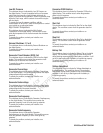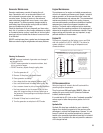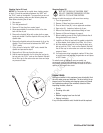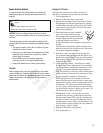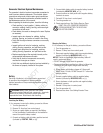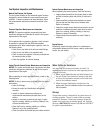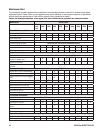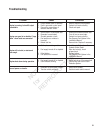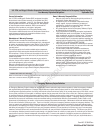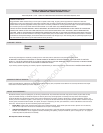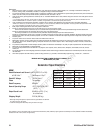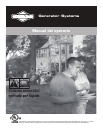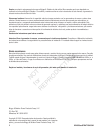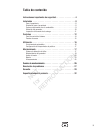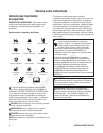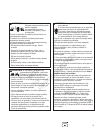
22 BRIGGSandSTRATTON.COM
U.S. EPA, and Briggs & Stratton Corporation Emissions Control Warranty Statement for Emergency Standby Engines
Your Warranty Rights And Obligations
September 2010
General Information
The U.S. EPA, and Briggs & Stratton (B&S) are pleased to explain
the emissions control system warranty on your Model Year 2010
and later engine / equipment. In the U.S., new Emergency Standby
Engines greater than 25HP must be designed, built, and equipped
to meet stringent emission standards. B&S must warrant the
emissions control system on your engine / equipment.
See Definition of appropriate use of Emergency Standby below.
The emission-related warranty covers all components whose failure
would increase an engine’s non-evaporative emissions of any
regulated pollutant referenced below.
Manufacturer’s Warranty Coverage:
Briggs & Stratton warrants that the engine is free from defects in
material and workmanship, and is also designed, built, and equipped
to conform to applicable regulations under Section 213 of the Clean
Air Act, from the time the engine is sold, until the expiration of its
warranty period.
This warranty applies to all emission related engine components
whose failure would cause engine exhaust emissions to be out of
EPA compliance. Further, this warranty also applies to other engine
components damaged due to the failure of any of these emissions
related components.
If a warrantable emissions related component on your engine is
defective, the part will be repaired or replaced by B&S at no cost to
you including diagnosis, parts, and labor.
Warranty coverage period is two years from date of original
purchase, and is offered to the original purchaser and each
subsequent purchaser so long as Owner’s Warranty Responsibilities
are adhered to.
Owner’s Warranty Responsibilities:
• Warranty claims shall be filed according to the provisions of
the Briggs & Stratton Warranty Policy.
• An engine may not be warrantable if subjected to abuse,
misuse, neglect, improper maintenance, unapproved
modifications, accidents not caused by Briggs & Stratton
engines or equipment, or by acts of God.
• Only those engines used as an Emergency Stationary Engine,
as defined below, are warrantable.
• You are responsible for presenting your engine / equipment to
a B&S distribution center, servicing dealer, or other equivalent
entity, as applicable, as soon as a problem exists. The warranty
repairs should be completed in a reasonable amount of time,
not to exceed 30 days. If you have any questions regarding your
warranty rights and responsibilities, you should contact B&S at
1-800-233-3723 or BRIGGSandSTRATTON.COM.
• If any components not scheduled for maintenance is repaired
or replaced under this warranty, the new part will be warranted
only for the remaining warranty period.
• If a warrantable component scheduled for maintenance
fails prior to its first scheduled replacement, the part will
be repaired or replaced by B&S at no charge to the owner.
Any such component is only warrantable until the originally
scheduled maintenance period has expired.
• Add on or modified parts that are not exempted by the EPA
may not be used. The use of any non-exempted add on or
modified parts by the owner will be grounds for disallowing a
warranty claim. The manufacturer will not be liable to warrant
failures or warranted parts caused by the use of a non-
exempted add on or modified part.
Emergency Stationary Engine Definition
An Emergency Stationary Engine is defined as any stationary internal combustion engine whose operation is limited to emergency situations
and required testing and maintenance. Examples include stationary engines used to produce power for critical networks or equipment
(including power supplied to portions of a facility) when electric power from the local utility (or the normal power source, if the facility runs on
its own power production) is interrupted, or stationary engines used to pump water in the case of fire or flood, etc. Stationary engines used
for peak shaving are not considered emergency stationary engines. Stationary engines used to supply power to an electric grid or that supply
power as part of a financial arrangement with another entity are not considered to be emergency engines. Emergency stationary ICE may be
operated for the purpose of maintenance checks and readiness testing, provided that the tests are recommended by Federal, State or local
government, the manufacturer, the vendor, or the insurance company associated with the engine. Maintenance checks and readiness testing
of such units is limited to 100 hours per year. There is no time limit on the use of emergency stationary engines in emergency situations. The
owner or operator may petition the Administrator for approval of additional hours to be used for maintenance checks and readiness testing,
but a petition is not required if the owner or operator maintains records indicating that Federal, State, or local standards require maintenance
and testing of emergency ICE beyond 100 hours per year. Emergency stationary ICE may operate up to 50 hours per year in non-emergency
situations, but those 50 hours are counted towards the 100 hours per year provided for maintenance and testing. The 50 hours per year for
non-emergency situations cannot be used for peak shaving or to generate income for a facility to supply power to an electric grid or otherwise
supply power as part of a financial arrangement with another entity. For owners and operators of emergency engines, any operation other
than emergency operation, maintenance and testing, and operation in non-emergency situations for 50 hours per year, as permitted above is
prohibited.
Form NO. 313540 Rev.-
MANUFACTURER OF RECORD
IMPCO is the Manufacturer of Record for all Environmental Protection Agency (EPA) compliance issues related to the manufature and use of the engine.
Please refer to Emissions Warranty for further information.
NOT
for
REPRODUCTION



